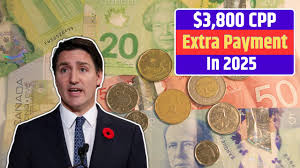The Canada Pension Plan (CPP) is a crucial source of financial security for millions of Canadians. Whether you’re nearing retirement or just starting to plan for the future, knowing the CPP payment details is essential. If you are wondering about the January 2025 payment dates, eligibility, and tips to maximize your benefits, this article will provide all the necessary information.
Overview of the Canada Pension Plan (CPP)
The CPP is a mandatory government program that ensures Canadians can maintain financial stability after retirement. It also provides benefits in cases of disability and to surviving spouses or common-law partners. The plan works by making contributions throughout your working years, which will later be paid out to you in monthly installments.
Each month, contributions are automatically deducted from your paycheck or made voluntarily if you’re self-employed. The more you contribute, the more you can expect to receive in retirement. For January 2025, CPP payments will range from $815 to $1,364, depending on several factors.
Key Details about the $3,800 CPP Extra Payment in January 2025
If you are eligible, you could receive an extra payment of up to $3,800 in January 2025. The payments for that month will be made on January 29, 2025, and they will be based on your previous contribution history and the age at which you choose to begin receiving your benefits.
Here’s a quick overview of the CPP payment details:
- Payment Date: January 29, 2025
- Payment Amount: Ranges from $815 (average) to $1,364 (maximum for those starting at age 65)
- Eligibility: Based on the amount of contributions made during your working years
- Adjustment: Your payment can be reduced if you start receiving CPP benefits early, or it can be increased if you delay your start date.
Understanding CPP Payment Amounts
The amount you receive from CPP is based on two main factors:
- Your Contribution History: The more you contribute, the higher your payments will be. If you contributed for a longer period or made larger contributions, your benefit will be higher.
- Your Start Age: You can begin receiving CPP benefits as early as age 60, but the amount will be reduced. On the other hand, delaying your benefits until after age 65 increases your payments.
- Example 1: If John starts receiving his CPP at age 60, his monthly payment will be reduced by 36% because he is taking it early.
- Example 2: If Emma delays her payments until age 70, she will receive 42% more than if she started at age 65, thus increasing her monthly benefits.
You can estimate your potential CPP payments by using the CPP Calculator available on Canada’s official website. This tool helps you understand how your unique contribution history influences your benefits.
January 2025 CPP Payment Date
If you’re eligible for the CPP payment in January 2025, mark your calendar for January 29, 2025, the scheduled payment date. Payments are generally processed on the third-to-last business day of the month, which makes it easier for recipients to plan their budgets.
To ensure that you receive your payment on time, follow these tips:
- Verify Your Information: Ensure your banking details and mailing address are correct. You can do this by logging into your My Service Canada Account.
- Set Up Direct Deposit: Direct deposit is a secure and reliable way to receive your CPP payments without delays. This method ensures that you don’t have to worry about disruptions caused by mail delivery or bank holidays.
- Track Your Payments: Regularly monitor your payment history. This will help you quickly notice any discrepancies and avoid unnecessary delays.
Eligibility for CPP Payments in January 2025
To qualify for CPP payments, you must meet these requirements:
- Contributions: You must have contributed to the CPP during your working years.
- Age: You can begin receiving CPP benefits as early as 60, or you can delay until 70. The age you choose to start affects your payment amount.
- Residency: CPP benefits are available to residents of Canada and eligible non-residents who have contributed sufficiently to the plan.
If you meet these criteria, you can start receiving the benefits you have earned throughout your career.
How to Maximize Your CPP Benefits
Here are some strategies to ensure you get the most out of your CPP benefits:
- Delay Your Start Date: If you can, wait to begin receiving your CPP until after age 65. For every year you delay, your benefits increase by 8.4%, up to a maximum of 42% by age 70. This strategy is especially helpful for people who are in good health and expect to live longer after retirement.
- Boost Contributions: If you are self-employed or have an income that fluctuates, aim to make consistent, full contributions to maximize your future CPP benefits.
- Consider Splitting Options: Couples can share their CPP benefits, potentially reducing their overall tax burden and giving them more financial flexibility.
- Diversify Your Retirement Income: While CPP is an important source of retirement income, it may not be enough on its own. Consider supplementing it with private savings, RRSPs, TFSAs, and employer pensions.
FAQs about the January 2025 $3,800 CPP Extra Payment
Here are answers to some frequently asked questions about the January 2025 CPP extra payment:
Q1: Can I still work while receiving CPP?
Yes, you can continue working while receiving CPP benefits. In fact, additional contributions after you start CPP can increase your post-retirement benefits through the Post-Retirement Benefit (PRB) program.
Q2: Can I receive CPP if I live outside Canada?
Yes, CPP payments are available globally, though the method of payment may vary depending on your location. Be sure to update your banking information to ensure smooth transactions.
Q3: Can I change my start date once I’ve begun receiving CPP?
No, once you start receiving CPP, your decision is final. It’s important to carefully consider your start date before applying. Consulting with a financial advisor can help you choose the best option for your situation.
Q4: Are CPP payments taxable?
Yes, CPP payments are considered taxable income. It’s important to factor these payments into your overall tax planning. Strategies like income splitting or contributing to tax-advantaged accounts can help reduce your tax liability.
Q5: What happens to my CPP if I pass away?
If you pass away, your surviving spouse or common-law partner may be eligible to receive a survivor’s pension. Additionally, a one-time death benefit will be paid to your estate or next of kin.








